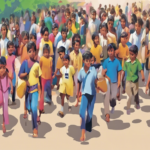The General Elections in India hold immense significance not just for the country itself, but also for the global political landscape. With the next General Elections scheduled for 2024, political parties are gearing up for an intense battle to secure power in the world’s largest democracy. Understanding the intricacies of Indian elections, the key players, and the issues at stake is crucial to comprehending the dynamics of this monumental event.
The Indian Electoral System
India follows a parliamentary system of government, where the President is the head of state and the Prime Minister is the head of government. The Parliament of India consists of two houses: the Lok Sabha (House of the People) and the Rajya Sabha (Council of States). The Lok Sabha is the lower house and is composed of elected representatives from across the country.
Key Political Parties
-
Bharatiya Janata Party (BJP): The ruling party in India led by Prime Minister Narendra Modi.
-
Indian National Congress: The main opposition party with a long history in Indian politics.
-
Aam Aadmi Party (AAP): Known for its anti-corruption stance and governance in Delhi.
-
All India Trinamool Congress (AITC): A prominent party in West Bengal led by Mamata Banerjee.
-
Dravida Munnetra Kazhagam (DMK): A major player in Tamil Nadu politics.
-
Shiv Sena: A regional party based in Maharashtra.
Election Process
The General Elections in India are vast operations conducted in multiple phases to ensure free and fair elections across the diverse regions of the country. The Election Commission of India oversees the entire process, from issuing election schedules to the declaration of results. Electronic Voting Machines (EVMs) are used for polling, ensuring efficiency and accuracy in the counting process.
Key Issues
Several crucial issues are likely to dominate the discourse leading up to the 2024 General Elections in India:
-
Economic Growth: With the impact of the COVID-19 pandemic still being felt, economic recovery and growth will be a top priority.
-
National Security: Border tensions with neighboring countries and internal security challenges will be significant issues.
-
Agricultural Reforms: The contentious farm laws and their impact on farmers are expected to be a major election issue.
-
Social Welfare: Healthcare, education, and social welfare programs will also feature prominently in the election campaigns.
Role of Media and Social Media
Media plays a significant role in shaping public opinion and disseminating information during elections. Traditional media outlets like newspapers and television channels, as well as digital platforms, are crucial for reaching a wide audience. Social media platforms are increasingly becoming vital in political campaigns, allowing parties to directly engage with voters and garner support.
Coalition Politics
In India, it is rare for a single party to secure a majority on its own in the Lok Sabha. This often leads to coalition governments, where parties come together to form a government. The ability to build and sustain alliances plays a crucial role in determining the political landscape post-election.
Women in Politics
Women’s representation in Indian politics has been a topic of discussion, with efforts being made to increase the participation of women in the electoral process. The representation of women in Parliament and state legislatures remains a key challenge that political parties need to address.
Impact of Regional Parties
Regional parties play a crucial role in Indian politics, particularly in states where national parties have a limited presence. These parties often champion regional issues and have significant influence in shaping national policies through coalition politics.
Ensuring Free and Fair Elections
Ensuring the integrity of the electoral process is paramount for upholding the democratic values of the country. From voter registration to the conduct of polling and the counting of votes, every step must adhere to the highest standards of transparency and fairness.
Frequently Asked Questions (FAQs)
- When are the 2024 General Elections in India scheduled to be held?
-
The exact dates for the 2024 General Elections have not been announced yet. Elections are typically held approximately five years after the previous election.
-
How is the Prime Minister of India elected?
-
The Prime Minister is the leader of the majority party in the Lok Sabha. After the General Elections, the President invites the leader of the majority party to form the government.
-
Can non-resident Indians (NRIs) vote in Indian elections?
-
NRIs are not eligible to vote in Indian elections unless they are physically present in their respective constituencies on polling day.
-
What is the age requirement to vote in India?
-
The minimum age to vote in India is 18 years. All citizens who are 18 and above are eligible to register as voters.
-
How are alliances typically formed in Indian politics?
-
Alliances are formed based on common ideologies or interests. Parties come together to maximize their chances of securing a majority in the elections.
-
Are independent candidates common in Indian elections?
-
While independent candidates do contest elections, they often face challenges in terms of funding and organization compared to candidates from major political parties.
-
How are election results verified in India?
-
Election results are verified through a combination of manual counting and the use of Electronic Voting Machines (EVMs) to ensure accuracy.
-
What role do opinion polls play in Indian elections?
-
Opinion polls provide insights into public opinion and trends leading up to the elections, helping parties strategize their campaigns and policies.
-
Can political parties accept foreign funding for election campaigns?
-
No, political parties in India are prohibited from accepting foreign funding for election campaigns under the Foreign Contribution (Regulation) Act.
-
How does the Election Commission ensure a level playing field for all parties during elections?
- The Election Commission enforces a Model Code of Conduct that lays down guidelines for parties and candidates to ensure fair play and prevent the use of money and muscle power.
In conclusion, the General Elections in India are a celebration of democracy that showcases the diverse voices and aspirations of its billion-plus population. The 2024 elections are poised to be a pivotal moment in shaping the future trajectory of the country, with issues of governance, development, and inclusivity at the forefront of the electoral discourse. Stay tuned for updates and insights as India gears up for this monumental event.





